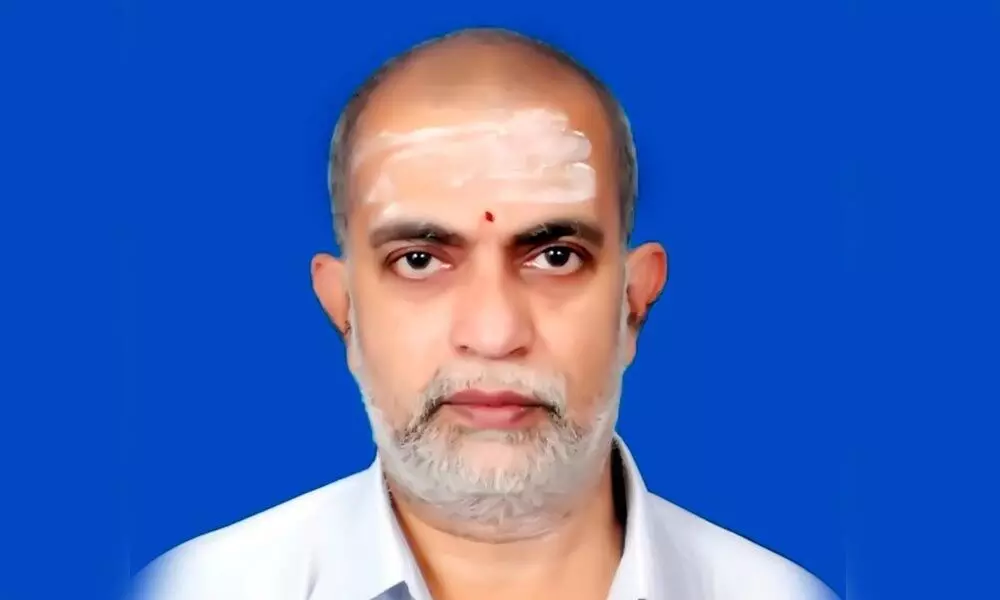Live
- PD Act invoked against red sanders smuggler
- Meghalaya scrape past Goa to secure QF berth
- India lift inaugural U19 Women’s Asia Cup
- No place for Stokes as Root returns to England’s squad for India ODIs and CT
- A year of political earthquake
- Penugonda stresses need for cultural renaissance
- IG inspects police stations at Chirala, Karamchedu
- Sandard Glass raises Rs40 cr in pre-IPO deal
- Options data flags rising volatility
- Contrarians in sight amid low volumes-led pull back rally
Just In
Andhra Pradesh: Hybrid immunity may give India an edge


Dr Alladi Mohan, Dean, SVIMS
- SVIMS dean Dr Alladi Mohan says Omicron is a more transmissible variant yet proportion of people developing severe disease is likely to be less
- But people should not ignore the Covid protocols as vaccination alone is not answer for the virus
- Effective reproductive number of Omicron in the UK now is above 5 as against Delta’s below one, which means doubling of cases every 2-3 days
Tirupati: Amid severe Omicron fears, doctors were of the view that it spreads through the susceptible population rapidly, resulting in a large number of cases. Though it is a more transmissible variant, the proportion of people developing severe disease is likely to be significantly less. However, people should not ignore the Covid protocols which can only prevent them getting infected again.
Speaking to The Hans India on the possible impact of Omicron in the country, dean of SVIMS University Dr Alladi Mohan said that Omicron surge is superimposing on the steady ongoing Delta wave. The effective reproductive number of Omicron in the UK currently is above five while that of Delta is below one which has resulted in a doubling of cases every 2-3 days.
Whether this variant will overwhelm the hospital capacity like in the peak of the second wave depends on the speed with which it spreads which is known as effective reproduction number and the severity of the disease. Due to immune evasive properties of the Omicron, the population susceptible to it has remarkably increased. While unvaccinated people are more susceptible than the double dose vaccinated, those who are infected and vaccinated which is known as hybrid immunity are least susceptible.
India had a very large Delta wave with close to 3/4th of its population getting infected. Simultaneously, the country had a fairly successful vaccination programme with 4/5th of the eligible population getting their first dose of vaccine.
Unlike in the pandemic's initial days in 2020, a large chunk of the population has acquired some form of immunity by vaccination or by prior infection. A single dose of vaccine following infection generates much higher immunity and this hybrid immunity will give India an edge against the Omicron.
Dr Mohan said that early data suggest that because of the mutations, the ability of the Omicron to multiply in the throat has increased several fold and its ability to multiply and destroy cells in the lung has decreased to a great extent which points to occurrence of less severe lung disease.
"The decreased virulence of the virus because of the immunity acquired by the population, occurrence of severe disease is going to be less. But it does not mean that people need not bother about its spread and should not forget Covid protocols," he opined.
Closed door social gatherings lead to super spreader events due to high aerosol load, regardless of vaccination status as vaccination alone is not the answer. There is no substitute to the standard four cornerstones of Covid-19 control–use of masks, avoiding social gatherings, improving room ventilation and vaccination. If these are not followed the advantage of hybrid immunity will be lost.

© 2024 Hyderabad Media House Limited/The Hans India. All rights reserved. Powered by hocalwire.com






